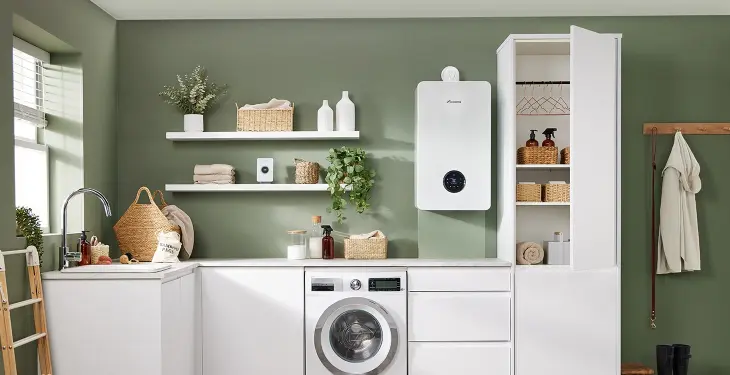
What you need to know about gas boilers going forward
On 13 March 2019, then Chancellor of the Exchequer, Philip Hammond, announced that there would be a ban on installing ‘fossil-fuel heating systems’ in any domestic new build properties from 2025 onwards, including gas and oil boilers.
The announcement was part of the Future Homes Standard, just one of the government’s many schemes to tackle climate change.
Research conducted by the Committee on Climate Change (CCC) found that energy use in homes accounted for 14% of the total UK emissions in 2017 and the committee warns that without the near-complete elimination of greenhouse gas emissions from UK buildings, the UK will not meet it’s legally-binding climate change targets.
More recently, on Wednesday 18th November, Prime Minister Boris Johnson, set out a 10 Point Green Recovery Plan which included a pledge to bring forward the ban on gas boilers in new-build properties
The announcement to bring forward the date from 2025 to 2023 left housebuilders and boiler companies stunned as they had serious concerns about the challenges they would face with developers and supply chains.
However, shortly after the announcement, many noticed the original statement stating; “2023 - Implement a Future Homes Standard for new homes, with low carbon heating and world-leading levels of energy efficiency.” was removed from the Number 10 website and replaced with "Homes built to Future Homes Standard will be ‘zero carbon ready’ and have 70-80% lower carbon emissions than those built to current standards."
According to a Downing Street Spokesperson, there had been a ‘mix up’ and “The government wants to implement the measures under the Future Homes Standard in the shortest possible time.
We’ve consulted on introducing this by 2025 and will set out further details in due course.” Despite this comment, it still leaves many unsure of what to expect, whilst others are urging for the ban to be introduced even sooner, asking, “Why wait?”
The question that is perhaps on many people’s minds is “But what will replace gas boilers?” There are many options, some of which will be more suitable for certain homes than others. Below are some of the most common types of gas boiler alternatives.
Heat pumps are devices that absorb natural heat found in the ground, air or water and compress it to increase the temperature which then heats the cold water in the system that is pumped to your radiators and hot taps.
The easiest system to install is an air source heat pump due to its ability to draw in surrounding air over the heat exchanger, as opposed to a ground source heat pump which requires the installation of pipework around your home to extract heat from the ground, in turn making it more expensive.
Unlike a traditional boiler, heat pumps don't require gas or oil as they solely use electricity.
Should this electricity be from a renewable source, there will be no carbon emissions produced, however, most electricity sources use fossil fuels, therefore meaning heat pumps aren’t entirely carbon-free.
These boilers work in a very similar way to a gas boiler, with the exception of electricity being used to heat the water. In the same way as heat pumps aren’t completely carbon-free when the electricity is produced through burning fossil fuels, electric boilers aren’t either, unless you invest in renewable sources such as solar panels.
Whilst they work in similar ways, there are some disadvantages of having electric boilers compared with gas ones, such as their inability to meet the heating and hot water demands of large properties in the same way gas boilers can and the high cost of electricity compared to natural gas.
The average cost of gas fuel in England, Scotland and Wales (per kilowatt-hour) is 4.17p, whereas electricity can cost anywhere between 9.76p-20.03p.
This makes the prospect of choosing electricity over gas unlikely, especially with approximately 2.4 million UK households expected to be in fuel poverty already.
Whilst solar heating systems can’t entirely eliminate your gas use, they can reduce it by up to 60%, which is a sizable saving, especially if used across large numbers of homes.
These systems use heat from the sun to warm your hot water, even in colder weather, through solar collectors. The hot water is then stored in a tank, similar to a conventional boiler system.
The system can be installed on flat or slanted roofs and can be mounted to walls. They can also be installed alongside your existing gas boiler to help reduce your home’s carbon footprint.
If you’re looking to buy a new boiler in the near future, you may be unsure as to whether you should purchase a gas boiler or opt for an electric boiler, heat pump, solar heating system or any other alternative to a gas boiler.
If climate change is a concern of yours and you are worried about a gas boiler being inefficient, you can rest easy knowing that iHeat only install A-rated efficient boilers.
A new combi boiler should be around 90% efficient, so replacing your old boiler with another gas combi boiler could save you up to £380 according to The Energy Saving Trust. Get a free fixed quote on a brand new boiler today with iHeat.
Last updated: 18th October, 2025

Written by Rick Hope
Managing Director at iHeat
Rick Hope is the Managing Director and Co-Founder of iHeat, leading the company’s mission to simplify boiler and renewable installations across the UK. With a background in digital strategy and business growth.
LinkedInArticles by Rick Hope are reviewed by iHeat’s technical team to ensure accuracy and reliability.

12th December, 2025
The best electric combi boilers in 2025 include models from Electric Heating Company, Heat...
 Read Article
Read Article

12th December, 2025
The Vaillant F22 fault means your boiler pressure is too low and needs topping up.
 Read Article
Read Article

12th December, 2025
A combi boiler should be around 1.0 to 1.5 bar when cold and up to about 2.0 bar when hot.
 Read Article
Read Article
No obligation. Takes less than 60 seconds.